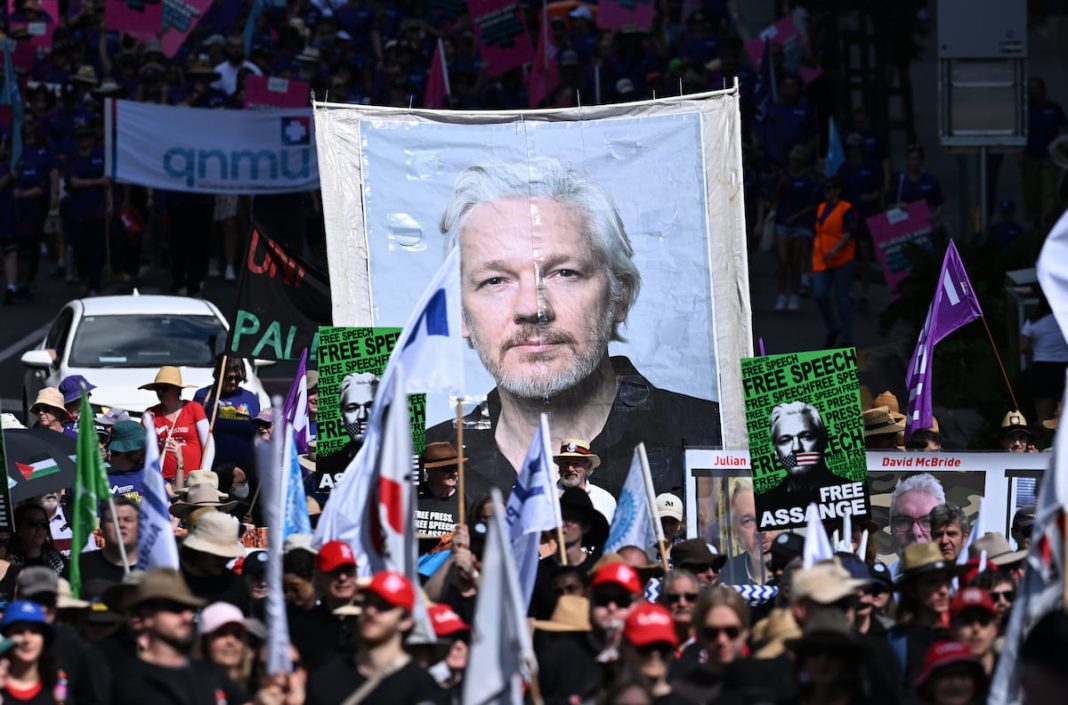WikiLeaks founder Julian Assange has left Britain and is due to plead guilty this week to violating US espionage law in a deal that will allow him to return home to Australia, ending a 14-year legal odyssey.
Assange, 52, has agreed to plead guilty to a single criminal count of conspiring to obtain and disclose classified US national defence documents, according to filings in the US District Court for the Northern Mariana Islands.
Assange is due to be sentenced to 62 months of time already served at a hearing on the island of Saipan at 9am local time on Wednesday.
Assange left Belmarsh prison in the UK on Monday before being bailed by the UK High Court and boarding a flight at Stansted Airport that afternoon, WikiLeaks confirmed.
A video posted on X by WikiLeaks showed Assange dressed in a blue shirt and jeans signing a document before boarding a private jet.
“Julian Assange is free,” WikiLeaks posted on X, formerly known as Twitter.
“This is the result of a global campaign that spanned grass-roots organisers, press freedom campaigners, legislators and leaders from across the political spectrum, all the way to the United Nations.
“This created the space for a long period of negotiations with the US Department of Justice, leading to a deal that has not yet been formally finalised. We will provide more information as soon as possible.”
He will return to Australia after the hearing, the WikiLeaks statement added, referring to the hearing in Saipan.
“Julian is free!!!!” his wife, Stella Assange, said in a post on X.
“Words cannot express our immense gratitude to YOU – yes YOU, who have all mobilised for years and years to make this come true.”
A lawyer for Assange did not immediately respond to a request for comment.
WikiLeaks in 2010 released hundreds of thousands of classified US military documents on Washington’s wars in Afghanistan and Iraq – the largest security breaches of their kind in US military history – along with swaths of diplomatic cables.
Assange was indicted during former president Donald Trump’s administration over WikiLeaks’ mass release of secret US documents, which were leaked by Chelsea Manning, a former US military intelligence analyst who was also prosecuted under the Espionage Act.
The trove of more than 700,000 documents included diplomatic cables and battlefield accounts such as a 2007 video of a US Apache helicopter firing at suspected insurgents in Iraq, killing a dozen people including two Reuters news staff. That video was released in 2010.
The charges against Assange sparked outrage among his many global supporters who have long argued that Assange as the publisher of WikiLeaks should not face charges typically used against US government employees who steal or leak information.
Many press freedom advocates have argued that criminally charging Assange represents a threat to free speech.
“A plea deal would avert the worst-case scenario for press freedom, but this deal contemplates that Assange will have served five years in prison for activities that journalists engage in every day,” said Jameel Jaffer, executive director of free speech organisation Knight First Amendment Institute at Columbia University.
“It will cast a long shadow over the most important kinds of journalism, not just in this country but around the world.”
Assange was first arrested in Britain in 2010 on a European arrest warrant after Swedish authorities said they wanted to question him over sex-crime allegations that were later dropped.
He fled to Ecuador’s embassy, where he remained for seven years, to avoid extradition to Sweden.
He was dragged out of the embassy in 2019 and jailed for skipping bail.
He has been in Belmarsh jail ever since, from where he has for almost five years been fighting extradition to the US.
While in Belmarsh he married his partner Stella with whom he had two children while he was holed up in the Ecuadorean embassy.
Assange’s family and supporters have said his physical and mental health have suffered during more than a decade of legal battles.
Agencies
Lifeline 13 11 14
beyondblue 1300 22 4636



